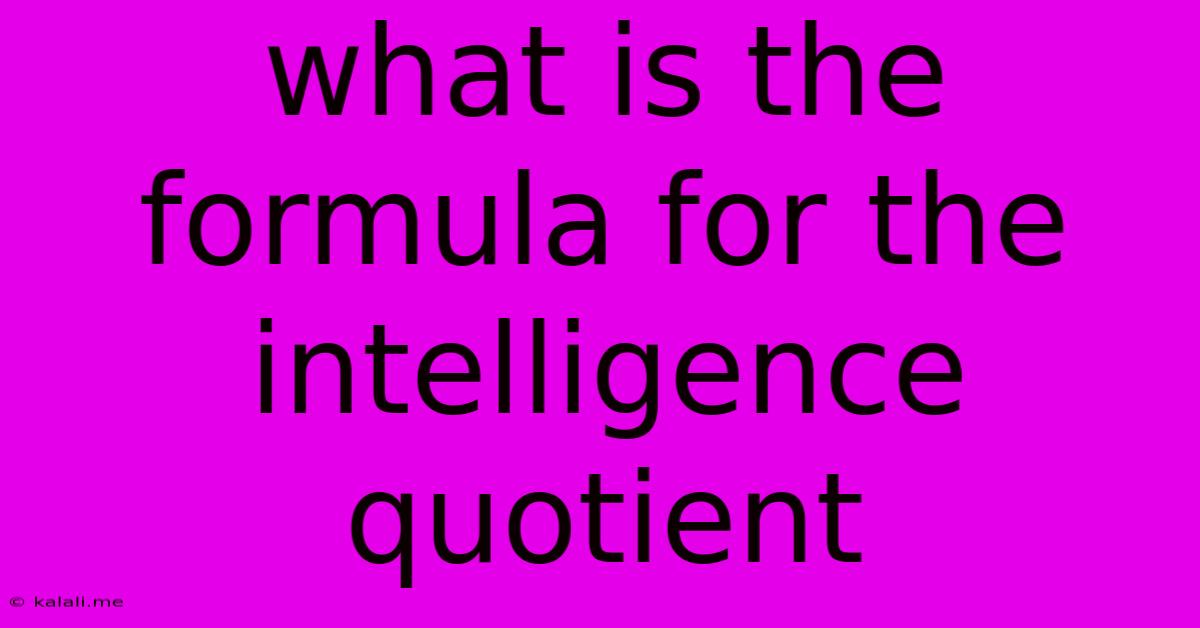What Is The Formula For The Intelligence Quotient
Kalali
Jun 14, 2025 · 3 min read

Table of Contents
Decoding the IQ Formula: What Determines Your Intelligence Quotient?
There's no single, universally accepted formula for calculating intelligence quotient (IQ). The methods used to assess IQ vary depending on the specific test administered, but they all share a common goal: to compare an individual's performance to the performance of others in their age group. This article delves into the fundamental principles underlying IQ calculations and explains why there's no single "formula" to define it.
Understanding that an IQ score is a comparative measure is key. It's not a direct measure of inherent intelligence, but rather a standardized score reflecting performance on specific cognitive tasks. Factors like processing speed, memory, reasoning, and problem-solving abilities are assessed, and the results are then compared to a normative sample. The resulting score is then statistically manipulated to achieve a mean (average) score of 100, with a standard deviation typically set at 15 (or sometimes 16).
The Statistical Foundation of IQ Scores
The core of IQ calculation lies in statistical analysis. Test developers administer their assessments to a large, representative sample of individuals from different backgrounds and age groups. This process is called standardization. The results of this sample then create a normative distribution, which is typically a bell curve. This bell curve shows the distribution of scores across the population.
The individual's raw score (number of correct answers) is then compared to this normative distribution. Sophisticated statistical methods—including z-scores and percentile ranks—are used to convert the raw score into an IQ score. This conversion ensures that the IQ score reflects the individual's relative standing within the population, not just their raw performance on the test.
Why There's No Single "Formula"
Different IQ tests employ various subtests and scoring methods. The Wechsler Adult Intelligence Scale (WAIS), for example, is structured differently from the Stanford-Binet Intelligence Scales. Each test has its own scoring system and statistical procedures. Therefore, there isn't a single mathematical equation that applies universally across all IQ tests.
Instead of a simple formula, the process involves:
- Raw Score Calculation: Adding up correct answers on each subtest.
- Age-Based Standardization: Comparing the raw score to the average score for individuals of the same age group.
- Conversion to Standard Scores: Transforming the age-based standardized score into a standard score (z-score) with a mean of 0 and standard deviation of 1.
- IQ Score Calculation: Finally, scaling the standard score to achieve the mean of 100 and standard deviation of 15 or 16, depending on the test.
The specific statistical procedures used to arrive at the final IQ score are complex and vary depending on the test used. Furthermore, the weighting of different subtests within the overall score can also differ, reflecting the test developers' understanding of the different facets of intelligence.
Beyond the Numbers: Understanding the Limitations of IQ
It's crucial to understand that IQ scores represent only one aspect of human intelligence. They assess certain cognitive abilities but don't capture the full spectrum of human potential. Creativity, emotional intelligence, practical intelligence, and other forms of intelligence are not fully encompassed within a single IQ score. Therefore, relying solely on IQ scores to gauge a person's overall abilities can be misleading and reductive. Furthermore, factors like cultural background, socioeconomic status, and even the individual's emotional state on testing day can influence results.
In conclusion, while the statistical methods used to calculate IQ scores are based on complex procedures involving standardization and statistical transformations, there isn't a single, simple formula. The calculation process is intricate and varies depending on the specific IQ test administered. Ultimately, IQ scores should be interpreted cautiously, considering their limitations and the multifaceted nature of human intelligence.
Latest Posts
Latest Posts
-
Which Of The Following Are Not Paralinguistic Features
Jun 14, 2025
-
How Do I Reschedule My Sat
Jun 14, 2025
-
1st Indian To Win Olympic Medal
Jun 14, 2025
-
Complete The Following Sentence By Using The List Of Options
Jun 14, 2025
-
What Subatomic Particle Has The Least Mass
Jun 14, 2025
Related Post
Thank you for visiting our website which covers about What Is The Formula For The Intelligence Quotient . We hope the information provided has been useful to you. Feel free to contact us if you have any questions or need further assistance. See you next time and don't miss to bookmark.